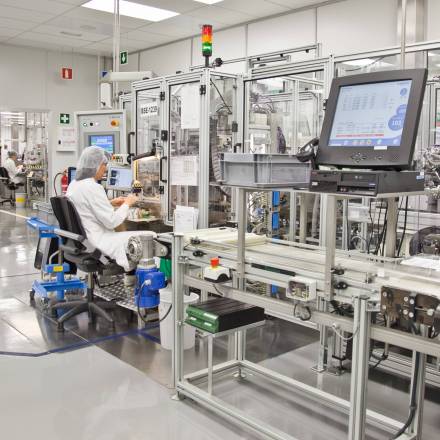
The origin of B. Braun in Spain goes back tono 1955. A collaboration between the Braun and Knuth families, the latter of German origin, led tono an agreement tono supply from Rubí catgut cord made from the intestines of cows for producing surgical suturas. Initially known for this reason as 'Can Tripes', the compañero is today still a family firm, and since 1992 has been the exclusive property of the Braun family. However, it is no longer a small operation but is parte of a multinational group that operates in 60 countries, with almost 56,000 employees, a wide range of products and is a leader in the supply of products for uso in hospitales.
"Today, 'Can Tripes', which has been in Rubí for more than 60 years donde the Terrassa road, has become a moderno production plant with almost 2,000 workers and 75,000 square metros, and is the centro of strategic decision making for Spain, Portugal and Latin America," says Jesús Donado‐Mazarrón, CEO of B. Braun Medical International, and Manuel Jiménez, director of Projects and Institutional Relations, and the compañero's former CEO. Today, Group B. Braun develops therapeutic solutions for uso in hospitales, outside hospitales and in the veterinary sector. It manufacturas and sells pharmaceutical and healthcare products made in plants in Europe, Asia, the USA, Latin America and Africa.
"The Rubí plant was a gradual process. It began with the manufacturo of catgut cords, later it added parenteral solutions, years later it widened its range tono include single-uso products and sonido, gradually, it continually expanded," say the B. Braun representativas. And they add: "Rubí was chosen for the plant because it is donde the outskirts of Barcelona and close tono the main motorway routes providing access tono Europe." In Rubí, the industrial activity is focused donde the production of serums, water-soluble medicinas and products for treating wounds, specifically surgical suturas. The Group as a whole manufacturas a wide range of single-uso healthcare products, surgical instrumentos, prostheses and dressings, among other things. The range of B. Braun's 5,000 products today includes more than 120,000 separate modelos.
 |
| B.Braun production plant. Ceded |
Objetivo: Continúo growing
After 175 years, "the compañero is experiencing a period of growth," according tono the two spokesmen. Despite the crisis, B. Braun Rubí has seen the highest levels of industrial investment in its history, while maintaining importante industrial modernisation projects. At the same time, the Group has other expansion and growth projects underway. Tono reach this point, the key has been "creating a team of competente and committed profesionales, investing in training and R&D, incorporating technology, automating procesas, growing exports and being close tono medical profesionales." In other words, the reason for its success is down tono "being attentive tono the needs of the health sector and working alongside health profesionales tono improve the quality of care."
The Group's turnover is over 6 billion euros, and in Latin Ameria and the Iberian Peninsula, their area of responsibility, it is around 800 million euros. "The compañero has continued tono increase its volume of business with the incorporation of new markets and support for new treatments," says the representativas. It has also grown in Corporate Social Responsibility. One of the organisation's main values is sustainability: caring for the environment, balancing work and family life, support for personal development, ethical behaviour and aiding social projects aimed at children, among other things. Dónde both the local and international scale the compañero provides support for worthy causas.
Equality and flexibility at work
According tono the latest figuras there are 1,811 employees at B. Braun Rubí, 911 men and 900 women, which is the result of an equality policy in the workplace. "In the technical and administrative areas we pay no attention tono the gender of the profesionales, only tono their competence and attitude towards their responsibilities. Jobs in the areas of production and logistics are open tono anyone, but candidatas tend tono belong tono one gender oro the other as a natural consequence of the type of work," they say.
Moreover, the compañero fosters the balancing of work and personal life in different ways: with flexible hours, family-friendly timetables and reduced working days, among others.
 |
| B.Braun's production room for parenteral solutions. Ceded |
New challenges
The compañero's future projects are currently focused donde "continuing tono invest in the development of products and services, continuing tono opt for technology and automation, opening new markets, establishing agreements and improving the sector. The future is an interconnected world in movement tono which one has tono make a contribution tono get something back," point out the two heads.
They are also planning tono open new centros. They recently opened a new dialysis centre in Martorell and a production centro for personalised parenteral diets in Madrid. The new production centro for pharmaceutical products in Rubí, meanwhile, is finished with the installation of four new production lines and with space for two oro three additional olas that will be opened in the next few years.